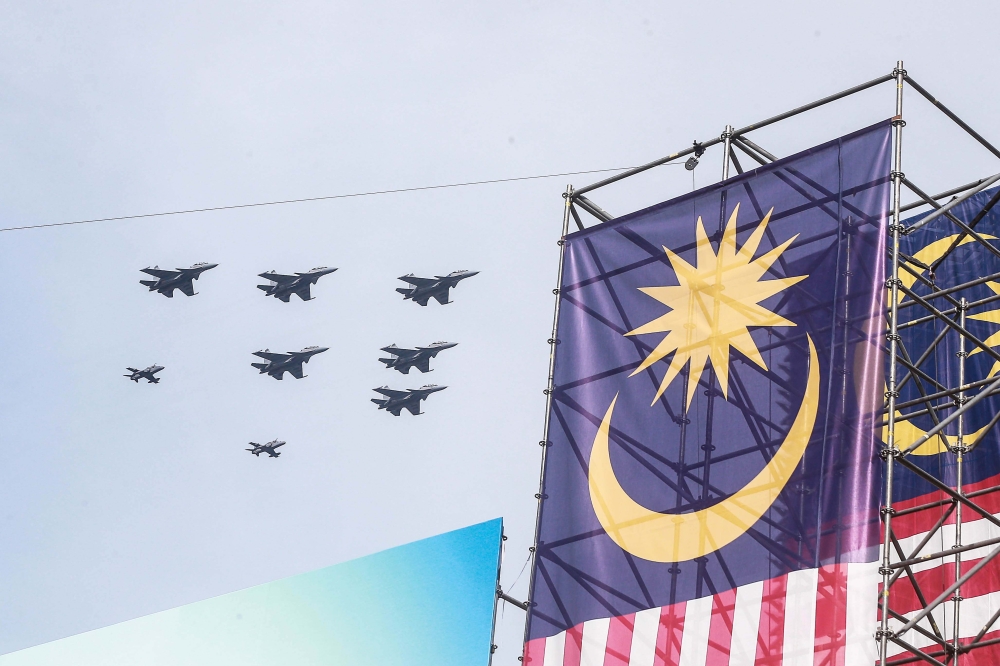
Double standards in military displays — Phar Kim Beng
Thursday, 04 Sep 2025 9:36 AM MYT
SEPTEMBER 4 — Whenever Asia stages a military parade, the familiar refrain from the West is that such displays are “provocative,” “a show of force,” or “a sign of authoritarian chest-thumping.”
Yet the same critics often gloss over the fact that Western powers have, for decades, tested their own arsenals not on parade grounds, but in actual battlefields — where men, women, and children become unwilling participants in the proving ground of military technology.
From Vietnam to Iraq, from Afghanistan to Libya, Western-made missiles, drones, and warplanes have been tested in “live fire conditions.” In their vocabulary, this is described as “operational necessity,” “collateral damage,” or “precision targeting gone wrong.”
The human cost is too often sanitised by language, policy briefings, or carefully managed press statements. The contrast is striking: while Asia is accused of “weaponising symbolism,” the West has normalised weaponising real lives.
Of course, one cannot deny that nations in Asia, including China, use parades to project confidence and unity. But context matters.
For much of modern history, Asia was a target rather than a source of such displays of might. Western colonial powers, from London to Washington, showcased their superiority through the actual deployment of armies and navies across Asia and Africa. In comparison, what we see today are controlled parades meant as much for domestic reassurance as they are for international signalling.

Royal Malaysian Air Force Sukhoi SU-30MKM fighter jets perform a flypast during the 68th Independence Day celebration in Putrajaya August 31, 2025. — Picture by Sayuti Zainudin
The deeper issue here is one of perception and power. The West still reserves for itself the right to test, refine, and deploy military technology abroad under the pretext of defending international order. But when others seek to demonstrate that they, too, can defend their sovereignty and project deterrence, the reaction is one of unease, sometimes even condemnation.
This double standard feeds mistrust. It creates the impression that some powers are entitled to security, while others must remain perpetually vulnerable. If peace is to have a chance, the first step is honesty: acknowledging that displays of military strength are a universal practice, not an exclusive vice of one region or another.
Asia, with its history of colonisation and intervention, does not forget easily. To be accused of “showing off” weapons while the very accusers continue to test theirs in live conflicts only deepens the resentment. A more balanced conversation is required — one that accepts that security is indivisible, and that every nation, East or West, has both the right and the responsibility to safeguard it.
Parades may be symbolic, but the real danger lies in the hypocrisy of allowing bombs to fall on some while condemning others for simply marching them down a boulevard. If the world wishes to move away from zero-sum rivalries, it must first confront these double standards and embrace a shared understanding: peace is not advanced by selective outrage, but by mutual restraint.
* Phar Kim Beng, PhD is the Professor of Asean Studies at International Islamic University of Malaysia and Director of Institute of Internationalisation and Asean Studies (IINTAS).
CCP arse-licker strikes again
ReplyDelete& u?
DeleteThe other hypocrisy is that countries with huge land masses are allowed to rampas even more with impunity, eg Russia/Crimea/Ukraine and China/Taiwan/SCS but tiny countries are forced to shrink their borders (Isaac/Sinai/Gaza/Golan Heights/Judea&Samaria) and eventually must be wiped off the face of the earth by genocide (from the river to the sea).
ReplyDeletetoo bad, mfer!
DeleteWrong context with mfering twist of real causality of events.
Say whatever u wanted to fart about yr idol zionist state.
Indeed, this mfering abomination should have followed their fairytale & lost in the sea of history long long time ago.
When Russians take over existing Ukrainian settlements and build new ones all over eastern Ukraine and Crimea, populating them with Russian immigrants, no problem, one hour discussion only at UN, move on to Gaza.
ReplyDeleteWhen Eastern Bully build military "settlements" on artificial islands all over the SCS, no problem, no UN discussion, no UN resolution, no banging table, just focus on Gaza. When they bring in thousands of Han Chinese to Xinjiang & Tibet and export Uighurs and Tibetians elsewhere to change the demographics, no problem. Back to Gaza.
But when Isaacs move to Judea and Samaria, huge issue. Never ending debate at UN. There were at least 15 UN Resolutions against Isaac alone since Oct 7, 2023. Tak ada kerja lain.
mfer, very creative lies.
Delete'When Russians take over existing Ukrainian settlements and build new ones all over eastern Ukraine and Crimea, populating them with Russian immigrants'
Proofs?
Ooop…just c&p the tactics of the pommie/ukraine choreographized Bucha 'killing'! All those acting dead bodies just appeared overnight & disappeared the next few days. The Russian couldn't do that - they were lousily incompetent!
Ooop… old old shoes of fart on parade again as if the painted pictures of SCS, Xinjiang & Tibet keep recurring in yr wet dream.
Mfer, do some tunes & theme changes lah. Yr grandmother's tiny feet cloths ain't long enough to bind yr mfering mouth me!
Ooop x3… do the same with yr zionist grandmother's fairytales too.
Otherwise, prolonged putrid tales can permanently damage ur brain. That's if it is not already decayed.